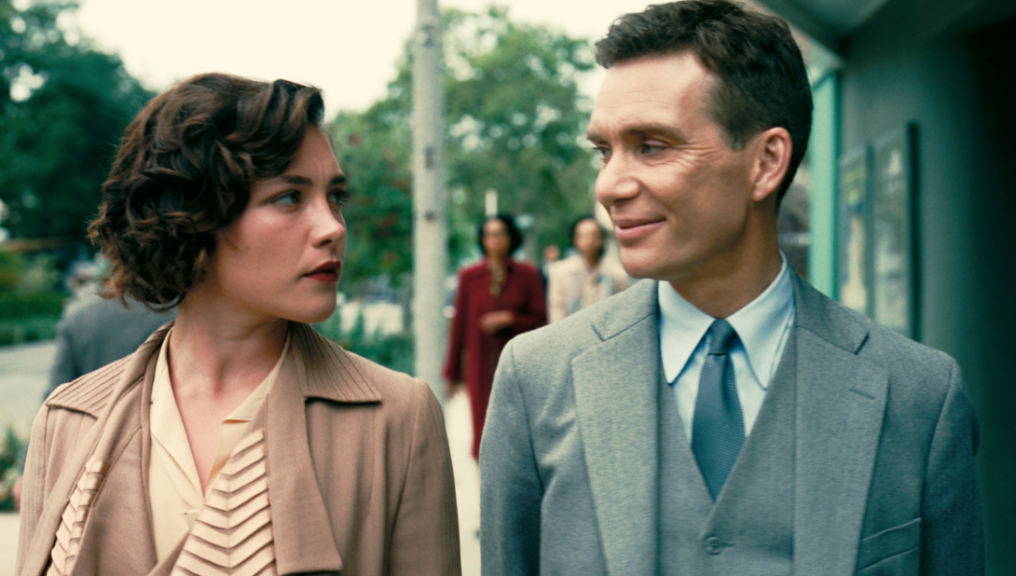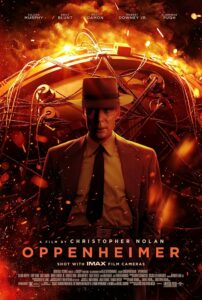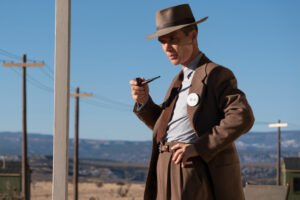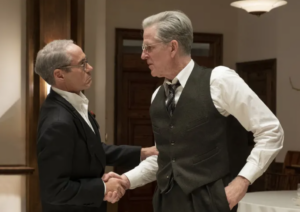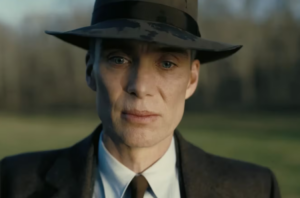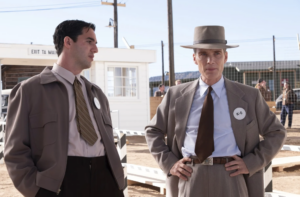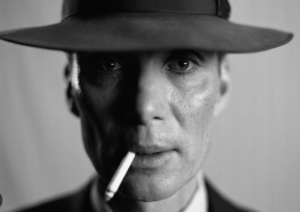Directed by Christopher Nolan | Written by Nolan, based on the book American Prometheus by Martin Sherwin and Kai Bird | 180 min | ▲▲▲▲△ | Amazon Prime
The return of Nolan to serious, biographical work about men and war — following his spectacular Dunkirk — shows his ambition hasn’t diminished one whit. This is a story swaddled in hubris, death, and that hollowness that comes when you contemplate the end of the world. With a cast this sprawling and that three-hour runtime, he’s got the biggest canvas he’s ever worked on and he makes the most of it.
The film engages with the story of atom bomb inventor J Robert Oppenheimer (played with blue-eyed steeliness by Cillian Murphy) in three chapters — in the 1930s as he rises to prominence in the scientific community in Europe and the United States, then the effort to recruit scientists to the Manhattan Project and the building of the bomb, and finally the aftermath of the war, dual interrogations in the 1950s, with Oppenheimer looking to retain his security clearance in the face of accusations of Communist connections, and Robert Downey Jr as Lewis Strauss, a businessman on the US Atomic Energy Commission who’s in the position of having to defend himself at a Senate confirmation hearing.
All this in a film that, typical of Nolan, is told in a time-jumping, non-linear narrative — though, thankfully, not nearly as confusing as it was in Tenet — through a gorgeous mix of black and white and colour cinematography by Hoyte Van Hoytema and a concussive sound mix, with a swirling, omnipresent score from Ludwig Göransson. Seen in IMAX, this is a genuine epic, though it’s also a movie about men talking in rooms, which is why maybe the key accomplishment here is how progressive it feels. Nolan is taking that hoariest of genres, the Second World War biopic, and making it entirely fresh using a suite of storytelling techniques, audio-visual bombast, and sheer filmmaking verve. He takes a lot of big swings.
The first act comes on like a locomotive — the movie is in a hurry to get to Los Alamos, to the place where the bomb was born. The most successful segment is the second act: the tension, ever mounting, between the need for complete secrecy and security — as overseen by Matt Damon’s General Leslie Groves — and a race to create a means to end the war before the Nazis do. The odd-couple connection between Damon and Murphy may be the key relationship in the film.
We’ve got to talk a little about Murphy, whose psychology is Oppenheimer’s cold heart. In what’s bound to be an Oscar-nominated role — along with Downey Jr, who offers a unique anxiety in Strauss we’ve never seen from the actor before — Oppenheimer is an enigma. While he was famously remorseful after the fact, this portrait offers no easy answers. His drive to build the bomb is anything but tentative, but he still finds time to be a philanderer, a loyal friend, and a stern and occasionally cruel taskmaster. He’s also called naive for being so clever about atomic energy but so clueless about political power. What he doesn’t seem to be is wracked with guilt. We do get a chilling scene where he hallucinates melting flesh and burned bodies, but it doesn’t really open him up. Instead it suggests he’s ambivalent.
And that is a surprise, especially as this movie was praised so vociferously by none other than Paul Schrader, the king of tales of masculine sin and suffering.
As the film pivots from the apocalyptic dispatch over Hiroshima and Nagasaki — and choosing to spare us any of the sights of that horror — it seems more concerned with Oppenheimer’s reputation and legacy than his possible regret for the terrible change he brought into the world. And while the last half hour brings a deft narrative twist that frames one character in direct opposition to another, the stakes never seem to be as high then as they are through the middle.
That makes for a slightly disappointing conclusion — despite the masterful narrative leaps in this film, it can’t quite match the comparative grace of Dunkirk, nor the emotional wallop of Interstellar. Nolan has his storytelling talents set fully on operatic, pushing Göransson’s score all over the film to the point of exhaustion. It’s fully effective for bringing suspense, but you may miss moments of silence and intimacy.
That said, as with every one of Nolan’s films, a repeat screening might be a benefit, to enter into his storytelling grip a second time. It could provide greater understanding of a connective fragment of his narrative that you missed the first time around. I’m certainly planning on it.
One of Oppenheimer‘s major pleasures is cast. It’s a movie where every five minutes another stellar performer comes along in a supporting role. Once again Nolan hasn’t framed his story around women, but has provided two solid roles in a sea of dudes — Emily Blunt, as Kitty Oppenheimer, our lead’s long suffering, alcoholic wife, and Florence Pugh as Jean Tatlock, his doomed lover.
Of the rest of the ensemble — one so sprawling that for awhile threatens to leave Oscar-winner Rami Malek without a single line of dialogue — standouts include Alden Ehrenreich, Macon Blair, David Krumholtz, Josh Hartnett, Benny Safdie, and in single scene cameos that they both nail, Casey Affleck and Gary Oldman.





